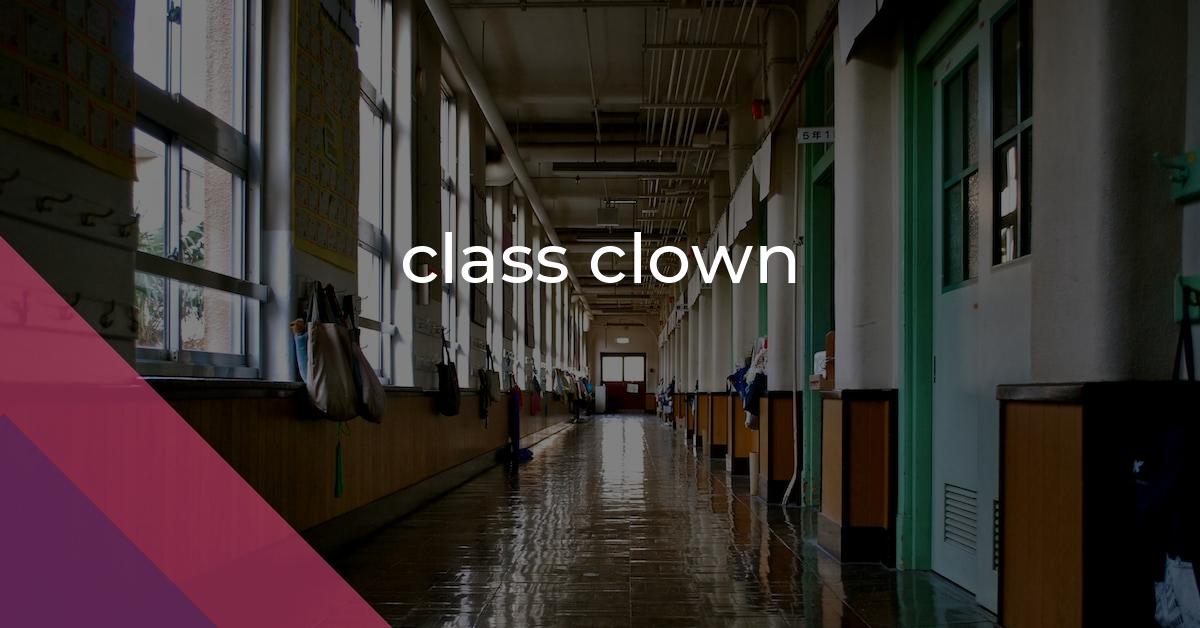class clown: Idiom Meaning and Origin
What does ‘class clown’ mean?
A "class clown" refers to a person who regularly makes jokes or acts silly in a classroom setting, often for attention or to entertain their peers, but may also disrupt learning.

Idiom Explorer
The idiom "play the fool" means to act silly or foolish, often for amusement or as a way to hide one's true thoughts or intentions.
The idiom "laughing stock" refers to a person or thing that is ridiculed and made fun of by others, causing amusement and laughter. It carries a negative connotation and is often associated with someone who is seen as absurd, ridiculous, or deserving of mockery.
The idiom "laugh a minute" refers to someone or something that is consistently funny or amusing, providing frequent moments of laughter.
*kid around*
(idiomatic) To engage in playful or lighthearted joking or teasing; to not be serious.
The idiom "jerkoff" is a vulgar slang term used to describe someone who is considered foolish, stupid, or annoying. It is an insult that implies a lack of intelligence or worthlessness.
When someone is "in stitches," it means they are uncontrollably laughing or finding something extremely amusing.
An "inside joke" is a humorous reference or remark that is understood only by a specific group of people who know the context behind it.
An idiom used to describe someone who is in an emotional or mental state of extreme agitation, distress, or confusion.
The idiom "have a laugh" means to find something amusing or entertaining and to enjoy a good laugh or joke.
Elusive Entertainer
The idiom "class clown" is a commonly used phrase in English. It refers to a student who often behaves in a humorous or disruptive manner in the classroom. The origins of this idiom can be traced back to the mid-19th century. While there are no definitive sources pointing to the exact origins, the phrase has become a well-established idiom in contemporary American English.
In its literal sense, the term "class clown" simply refers to a student who displays clown-like behavior in the classroom. This behavior may include telling jokes, performing physical comedy, or engaging in attention-seeking antics. The humor exhibited by the class clown aims to entertain their classmates and lighten the mood of the classroom.
The underlying motivation behind the class clown's behavior can vary. Some class clowns may use humor as a coping mechanism to deal with social anxiety or to mask feelings of inadequacy. Others may seek attention and validation from their peers, using humor to gain popularity or fit in with their class.
While the class clown may bring laughter and amusement to their classmates, their behavior can also be seen as disruptive and potentially detrimental to the learning environment. Teachers often face the challenge of balancing discipline and order while allowing for creativity and self-expression in the classroom. The class clown can disrupt lessons and detract from the educational experience for themselves and others.
The term "class clown" is not limited to a specific age group, as this behavior can be observed in students from elementary school through college. Similar characters can be found around the world in various cultures and educational systems.
Understanding the class clown requires a nuanced perspective. It is important to acknowledge the underlying motivations and emotional needs that may drive their actions. By recognizing the complexity of the class clown archetype, educators can help create an inclusive and supportive classroom environment that addresses the needs of all students.
The idiom "funny man" is another phrase related to the class clown. The funny man is someone who is known for their humorous and entertaining personality. They often make others laugh and bring joy to social situations. In the context of the classroom, the class clown can be seen as playing the role of the funny man, using their humor to entertain their peers and create a lively atmosphere.
The idiom "drama queen" is also related to the class clown. A drama queen is a person who tends to exaggerate, overreact, or create drama for attention. While the class clown may not exhibit the same level of dramatic behavior as a drama queen, they do share the common characteristic of seeking attention. The class clown's humorous antics can be seen as a form of attention-seeking behavior, similar to that of a drama queen.
The idiom "class clown" represents a student who engages in humorous and attention-seeking behavior within the classroom. This well-established phrase has been a part of the English language for many years. While the impact of the class clown's antics can be both amusing and disruptive, understanding their motivations and needs can aid in creating a positive educational experience for all students.
Example usage
Examples of how the idiom class clown can be used in a sentence:
- The teacher asked the class clown to please stop making jokes while she was trying to teach.
- Everyone loved the class clown for lightening the mood during a boring lecture.
- The principal had to speak to the parents of the class clown about his disruptive behavior in school.
More "Personality" idioms



